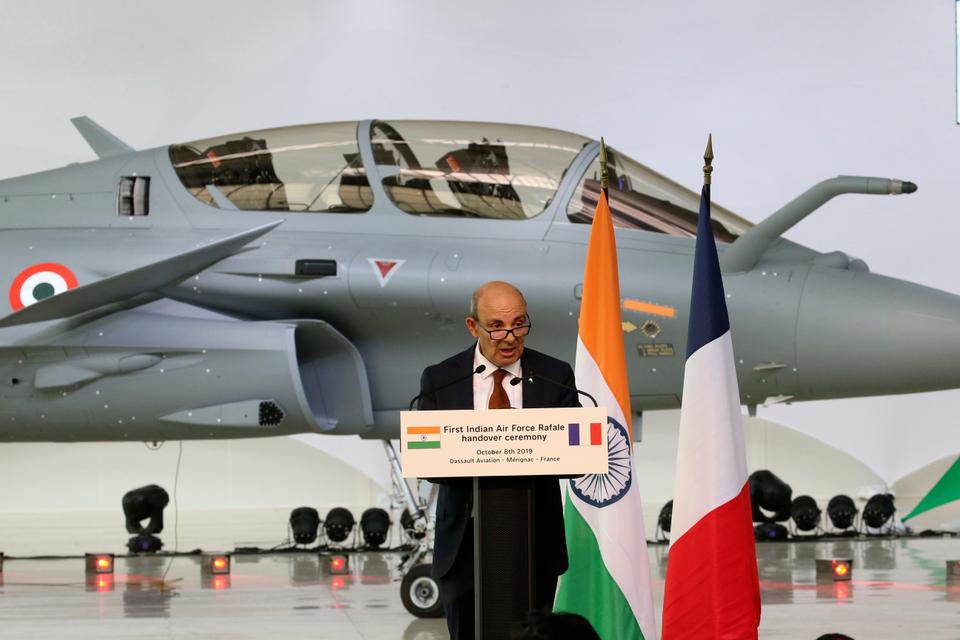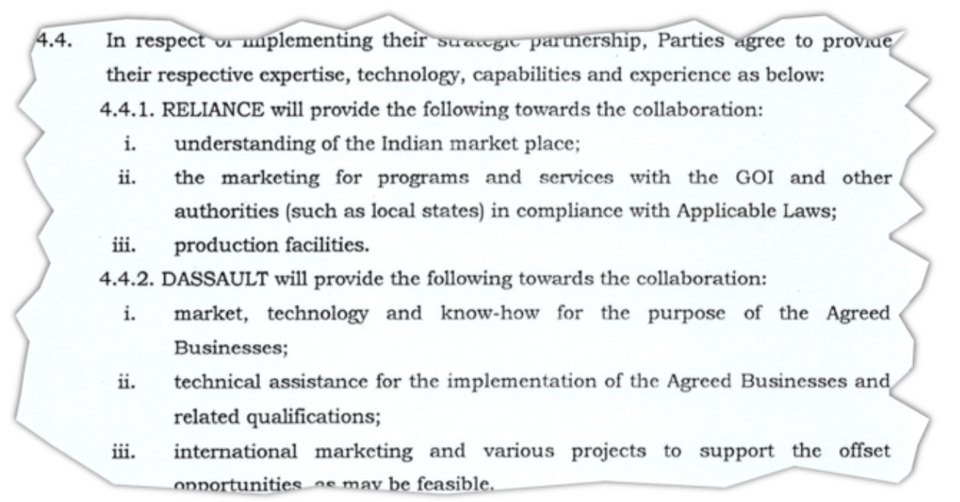
A judicial inquiry has been launched into the 2016 multi-billion-dollar deal between France and India, long shrouded in allegations of corruption, favouritism and involvement from the highest offices in both countries.
In the latest development to surface over France’s controversial 2016 Rafale jet deal with India, an independent probe has been launched to investigate suspected corruption and favouritism surrounding the €7.8 billion ($9.2 billion) purchase.
An inquiry into the inter-governmental deal for 36 fighter jets was formally opened on June 14 following a decision by France’s public financial prosecutor (PNF), French investigative outlet Mediapart reported last Friday.
Appointed by the PNF, a judge will take aim at the top offices involved in the approval of the deal and question the actions of former French president Francois Hollande, who was in office when the deal was signed; current president Emmanuel Macron, who was economy and finance minister at the time; and then-defence minister Jean-Yves Le Drian, who is now Macron’s minister for foreign affairs.
The probe has been launched in the wake of a series of investigative reports published by Mediapart in April, which, apart from possible financial crimes, also revealed the role of a middleman named Sushen Gupta, now under investigation in India in connection with another defence deal.
Gupta was allegedly paid several million euros in secret commissions to offshore accounts and shell companies by French aeronautical company Dassault Aviation and defence electronics firm Thales, ostensibly to influence the Rafale deal.
In their investigations into the routes of those funds, India’s Enforcement Directorate (ED) – an anti-money laundering agency – discovered that Gupta also “received kickbacks” with the aim of influencing the outcome of “other defence deals” like Rafale, said Mediapart.

Separately, those payments were on top of an additional €1 million ($1.2 million) “gift” from Dassault to an Indian company to create 50 replicas of its Rafale jets, models which Dassault was not able to prove existed after an audit by the French anti-corruption agency (AFA).
That company, Defsys Solutions, is one of Dassault’s subcontractors in India – and was linked to Gupta, who had sent the invoice within six months of the 2016 deal being signed.
In March 2019, Gupta was arrested by the ED over a scam dubbed “Choppergate”, which centred on a €550 million ($650 million) contract for the sale to India of helicopters manufactured by Italian-British firm AgustaWestland.
Despite being aware of the Rafale-related disclosures, ED chose not to investigate any further. Nor did PNF at the time.
That the ED had information regarding allegedly corrupt actions in connection with the Rafale deal are particularly relevant in light of reporting by the Hindu in 2019, which found that standard procurement-related anti-corruption clauses penalising companies for employing agents or middlemen were dropped by the government at Dassault’s behest before the agreement was finalised.

Following Mediapart’s expose in April, French anti-corruption NGO Sherpa filed a complaint with the tribunal of Paris citing “corruption”, “money laundering”, “influence peddling”, “favouritism” and unwarranted tax waivers pegged to the deal.
Sherpa’s complaint initiated the PNF to designate a magistrate to investigate the alleged crimes.
Sherpa’s lawyers William Bourdon and Vincent Brengarth said in a statement to Mediapart that the launch of the probe “will necessarily favour the emergence of the truth and the identification of those responsible in what increasingly resembles a state scandal”.
In response, Dassault said that it “acts in strict compliance with the OECD Anti-Bribery Convention and national laws”.
“Numerous controls are carried out by official organizations, including the French Anti-Corruption Agency. No violations were reported, notably in the frame of the contract with India for the acquisition of 36 Rafales”, Dassault added.

Speaking to The Wire, Prashant Bhushan, an eminent Indian lawyer who had previously demanded a probe into the deal by the India’s Supreme Court, said: “The Mediapart story further corroborates the whole string of evidence which we had placed before the Supreme Court seeking an independent investigation into the deal.”
He added that it was “unfortunate that the Indian media did not follow up” on the scandal.
What is the controversy about?

In what was India’s largest defence procurement deal, prime minister Narendra Modi and his Hindu nationalist government inked an agreement with France in September 2016 to deliver 36 Rafale warplanes by 2022, choosing Dassault Aviation over its traditional Russian MiGs.
So far, India has received three batches of the jets.
The deal has a 50 percent “offset” clause to be executed by Dassault and its partners. Indian defence procurement rules state that foreign firms need to invest at least 30 percent of a deal’s worth back into the country, in order to boost domestic manufacturing.
What kicked off a political storm was when the main opposition Congress party accused the government of crony capitalism by favouring a private Indian company – Anil Ambani’s Reliance group, and a man with close ties to Modi – to be Dassault’s offset partner.
Saddled with ageing Soviet-era aircrafts, India made the decision to upgrade its squadron of fighter jets in 2001 and officially put out a tender in 2007 to purchase 126 planes.
In 2008, Dassault along with the likes of Boeing and Saab had put in bids. In 2012, Dassault submitted the lowest bid, and was shortlisted. State-run Hindustan Aeronautics Limited (HAL) was selected as its offset partner to produce 108 jets in India.
But the deal stalled as the two partners couldn’t finalise an agreement, and in 2014 it was put on hold after the BJP’s election victory.
During a visit to France in 2015, Modi decided to upend the original tender to purchase 36 “ready to fly” Rafale jets instead, cutting out HAL from the equation.
Documents seen by Mediapart show Dassault and Reliance had in fact signed their first Memorandum of Understanding (MoU) on March 26, 2015 – fifteen days before Modi’s decision to overturn the prior agreement.
Then two months after the 2016 deal was approved, Dassault and Reliance signed a “shareholders’ agreement” which set out their relationship in a future joint venture company created in 2017 called Dassault Reliance Aerospace Limited (DRAL).
The joint venture had extraordinary financial terms where Dassault, which held a 49 percent stake, pledged to provide 94 percent of the total €169 million ($200 million) investment into the subsidiary.
According to confidential documents it managed to obtain, Mediapart revealed how Dassault had no industrial interest in forming a partnership with Reliance other than for political reasons and “marketing for programs and services with the GOI (Government of India)”.

India’s response to the allegations
In India, there are fresh calls to investigate the deal following the Mediapart expose.
Congress spokesperson Randeep Surjewala said in a press briefing that in light of the emerging facts, his party renewed its call for a Joint Parliamentary Committee (JPC) probe into the matter.
“We have always maintained that a JPC probe into the Rafale deal, and not a court hearing, will clear the air,” he said.
“The scandalous expose of the Rafale scam, involving massive corruption, treason and loss to the public exchequer, has finally been uncovered and laid bare.”
“If France can probe the role of its former president, its former defence minister and perhaps its current president in facilitating the controversial deal, why shouldn’t India come clean on the matter?”
Responding to the allegations, BJP spokesperson Sambit Patra attacked the Congress party for trying to mislead the Indian public and resorting to peddling “lies” and that “no corruption in the deal has been proven”.
He instead blamed “corporate rivalry” in France for the allegations.
Even if the government tries to brush it under the carpet, it won’t be easy. As the case progresses in France, India is set to feel its ripples too.
The question is, will the allegations be put in cold storage or fervently pursued this time around?
Social media is bold.
Social media is young.
Social media raises questions.
Social media is not satisfied with an answer.
Social media looks at the big picture.
Social media is interested in every detail.
social media is curious.
Social media is free.
Social media is irreplaceable.
But never irrelevant.
Social media is you.
(With input from news agency language)
If you like this story, share it with a friend!
We are a non-profit organization. Help us financially to keep our journalism free from government and corporate pressure.












0 Comments